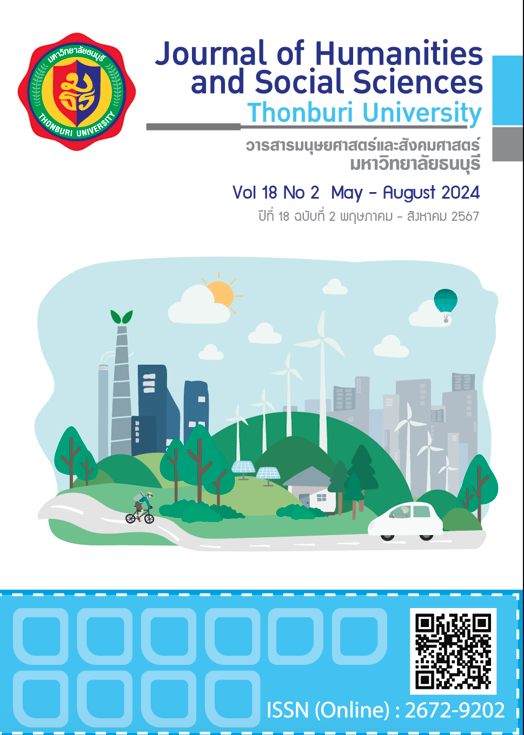Soft Power Policy: The Administration of a Creative Economy to Develop the Potential of Cultural Tourism Industry of Ban Khlong Khae Community, Samut Sakhon Province
Keywords:
Soft Power, Creative Economy, Tourism Industry, Cultural CommunityAbstract
This research article aimed 1) to study the soft power policy to promote the cultural tourism industry 2) to study the Administration of a Creative Economy of Ban Khlong Khae community and 3) to study the Administration of a Creative Economy to Develop the Potential of Cultural Tourism of Ban Khlong Khae Community, Samut Sakhon Province. Qualitative research methodology, including collection of data by documentary, focus group and in-depth interview. The target group of 32 people was composed of 12 people who are committee of the Ban Khlong Khae tourism community enterprise, along with 20 people composed of the community enterprise group members, entrepreneur and villagers. The data was collected and analyzed by using content analysis. The results showed that the issues impacting the culture of the Ban Khlong Khae community to be consistent with the soft power policy as a way of life that co-exists, along with the river, to conserve natural resources, the environment and to participate in the folk sport, " Lo Kra Tha". While the administration of a creative economy consists of discover issues, skill development, link for business opportunities, and developing creative area; which can encouraging a mindset from which a vision for a creative approach for the Ban Khlong Khae community will evolve, namely a Community of Conservation, Culture, Way of River or “Withi Tara”; and the administration of the creative economy within the cultural tourism dimension and folk sports are based on the soft power policy, it was found that content can be created to add value from resources of traditional culture and skill development is further generated through combining with the water park of the Ban Khlong Khae community tourism enterprise group at the community level. In addition, the increased activity is an attraction to develop the Potential of Cultural Tourism of the Community, as well as accessibility and facilities that operate appropriately in line with the creative economy.
References
กนกวรา พวงประยงค์. (2561). บทบาทของเศรษฐกิจสร้างสรรค์และพฤติกรรมเชิงสร้างสรรค์ในการพัฒนายกระดับวิสาหกิจชุมชนไทย. วารสารพัฒนศาสตร์, 1(1), 220-252.
โครงการความมั่นคงศึกษา. สุรชาติ บำรุงสุข. (2557). Soft Power [จุลสาร]. กรุงเทพฯ: สแควร์ ปริ๊นซ์.
ดวงฤทธิ์ เบ็ญจาธิกุล ชัยรุ่งเรือง. (2565). การขับเคลื่อน Soft Power: อัตลักษณ์ท้องถิ่นภาคใต้เพื่อส่งเสริมการท่องเที่ยวจังหวัดชุมพร. วารสารสันติศึกษาปริทรรศน์ มจร, (11)5, 1922-1935.
ปัทมา จันทร์เจริญสุข. (2558). การ์ตูนญี่ปุ่น: Soft Power ของนโยบายด้านวัฒนธรรม ของประเทศญี่ปุ่น. สืบค้นเมื่อ 12 สิงหาคม 2564,จาก http://researchconference.kps.ku.ac.th/article_6/pdf/o_human42.pdf
พิริยะ ผลพิรุฬห์. (2556). เศรษฐกิจสร้างสรรค์กับการพัฒนาประเทศไทย. วารสารเศรษฐศาสตร์ปริทรรศน์ สถาบันบัณฑิตพัฒนบริหารศาสตร์, 7(1), 1-69.
พีระ เจริญวัฒนนุกูล. (2561). พินิจแนวคิด Soft Power อย่างจริงจัง: ปัญหาและความเข้าใจผิดในการประยุกต์ใช้แนวคิดนี้ในงานวิชาการไทย. รัฐศาสตร์นิเทศ, 4(1-2), 239-277.
มาลินี ศรีไมตรี. (2559). การพัฒนารูปแบบและศักยภาพของกลุ่มวิสาหกิจชุมชนด้านการท่องเที่ยวเชิงวัฒนธรรมตามอัตลักษณ์ของท้องถิ่นสู่นักท่องเที่ยวจังหวัดอุบลราชธานี. วารสารการบริการและการท่องเที่ยวไทย, 11(2), 53-65.
รัฐนันท์ พงศ์วิริทธิ์ธร และณภัทร ทิพย์ศรี. (2559). เศรษฐกิจสร้างสรรค์ที่เหมาะสมกับนักท่องเที่ยวเพื่อการพัฒนาการท่องเที่ยวเชิงอนุรักษ์ของถนนคนเดิน จังหวัดเชียงใหม่. วารสารวิชาการ มหาวิทยาลัยธนบุรี, 10(21), 79-91.
รุยาภรณ์ สุคนธทรัพย์. (2561). การบริหารจัดการทรัพยากร Soft Power ของไทย. รัฏฐาภิรักษ์, 60(3), 47-55.
สำนักงานบริหารและพัฒนาองค์ความรู้ (องค์การมหาชน). (2565). Soft Power ที่ยิ่งใหญ่ สร้างได้จากหน่วยเล็กๆ ในสังคม. เดอะ โนวเลจ, 4(22), 51.
สุดเฉลิม ศัสตราพฤกษ์ และนพรัตน์ พบลาภ. (2565). การส่งเสริมเศรษฐกิจพอเพียงเพื่อการพัฒนาเศรษฐกิจชุมชนของชุมชนบ้านชายทะเลรางจันทร์ จังหวัดสมุทรสาคร. วารสารวิจัยราชภัฏเชียงใหม่, (23)2, 103-120.
สุวิทย์ เมษินทรีย์. (2564). เศรษฐกิจสร้างสรรค์: BCG Soft Power นำไทยสู่โลก. สืบค้นเมื่อ 5 ธันวาคม 2564, จาก https://thaipublica.org/2021/02/suvit-maesincee19/
เสาวรภย์ กุสุมา ณ อยุธยา. (2553). Creative Economy ทางเลือกใหม่ในการพัฒนาเศรษฐกิจไทย. วารสารนักบริหาร, 30(1), 23-28.
อิงอร เนตรานนท์. (2563). พลังอำนาจแห่งชาติซอฟต์พาวเวอร์ของไทยในศตวรรษที่ 21. วารสารสถาบันวิชาการป้องกันประเทศ, 11(1), 33-47.
Burkart, A. J., & Medrik, S. (1981). Tourism: Part Present and Future. Oxford: Butterworth Hienemari Ltd.
Mill, R., & Morrison, A. M. (1992). The Tourism System: and Introductory Text. New Jersey: Prince – Hall.
Translated Thai References
Chairungruang, B. D. (2023). Driving Soft Power: Southern Local Identity to Promote Tourism in Chumphon Province. Journal of MCU Peace Studies, (11)5, 1922-1935. (in Thai)
Chancharoensuk, P. (2015). Japanese’s Cartoon: Soft Power of Japanese’s Cultural Policy. Retrieved August 12, 2021, from http://researchconference.kps.ku.ac.th/article_6/pdf/o_human42.pdf (in Thai)
Charoenvattanannukul, P. (2018). Rethinking Soft Power: Problems and Misunderstandings in applying The Concept in Thailand. Political Science Review, 4(1-2), 239-277. (in Thai)
Maesincee, S. (2021). Creative Economy: BCG Soft Power Brings Thailand to The World. Retrieved December 5, 2021, from https://thaipublica.org/2021/02/suvit-maesincee19/ (in Thai)
Na Ayudhya, K. S. (2010). Creative Economy a New Alternative for the Development of the Thai Economy. Executive Journal, 30(1), 23-28. (in Thai)
Nedtranon, I. (2020). Thai National Soft Power within the 21st. National Defence Studies Institute Journal, 11(1), 33-47. (in Thai)
Office of Knowledge Management and Development (Public Organization). (2022). Great Soft Power can be created from Small Units in Society. The Knowledge, 4(22), 51. (in Thai)
Pholphirul, P. (2013). Creative Economy and Development Issues in Thailand. NIDA Economic Review, 7(1), 1-69. (in Thai)
Phuangprayong, K. (2018). Roles of Creative Economy and Innovative Behavior for Community Enterprise Development in Thailand. PSDS Journal of Development Studies, 1(1), 220-252. (in Thai)
Pongwiritthon, R., & Thipsri, N. (2016). Suitable Creative Economy for Tourists on Ecotourism Development of Chiang Mai Sunday Walking Street. Journal of Thonburi University, 10(21), 79-91. (in Thai)
Sattrapruek, S. and Poblarp, N. (2022). Sufficiency Economy Promotion for Community Economic Development of Ban Chai Thale Rangchan Community, Samut Sakhon Province. Rajabhat Chiang Mai Research Journal, 23(2), 103-120. (in Thai)
Security Studies Project. Bamrungsuk, S. (2014). Soft Power [Pamphlet]. Bangkok: Square Print. (in Thai)
Srimaitree, M. (2016). Model and Potential Development of Community Enterprises in the Cultural Tourism Based on Local Identity to Tourists in Ubon Ratchathani Province. Journal of Thai Hospitality & Tourism, 11(2), 53-65. (in Thai)
Sukontasap, R. (2018). Invigorating Thailand’s Soft Power Resources. The National Defence College of Thailand Journal, 60(3), 47-55. (in Thai)
Downloads
Published
How to Cite
Issue
Section
License
Copyright (c) 2024 soodchalerm sattrapruek

This work is licensed under a Creative Commons Attribution-NonCommercial-NoDerivatives 4.0 International License.
ผลงานที่ปรากฎในวารสารฉบับนี้เป็นลิขสิทธิ์เฉพาะส่วนบุคคลของผู้เขียนซึ่งต้องรับผิดชอบต่อผลทาง กฎหมายที่อาจเกิดขึ้นได้และไม่มีผลต่อกองบรรณาธิการ






